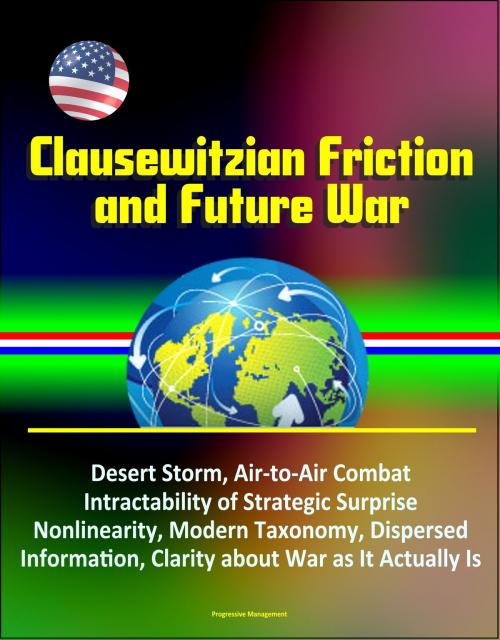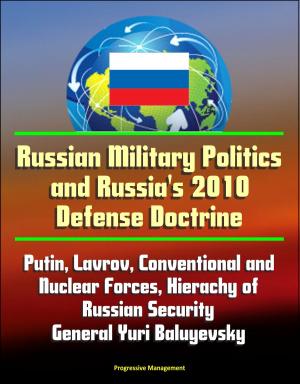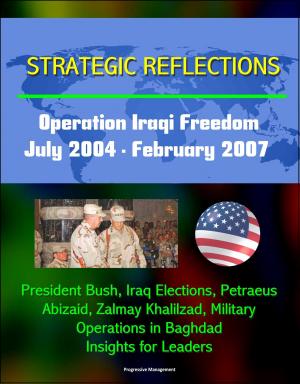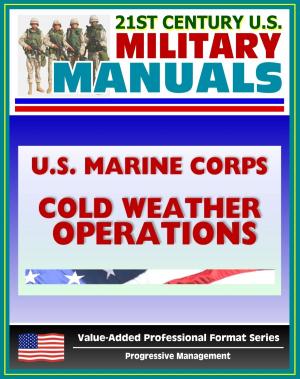Clausewitzian Friction and Future War: Desert Storm, Air-to-Air Combat, Intractability of Strategic Surprise, Nonlinearity, Modern Taxonomy, Dispersed Information, Clarity about War as It Actually Is
Nonfiction, History, Military, Strategy, United States| Author: | Progressive Management | ISBN: | 9781311999238 |
| Publisher: | Progressive Management | Publication: | April 13, 2016 |
| Imprint: | Smashwords Edition | Language: | English |
| Author: | Progressive Management |
| ISBN: | 9781311999238 |
| Publisher: | Progressive Management |
| Publication: | April 13, 2016 |
| Imprint: | Smashwords Edition |
| Language: | English |
This excellent report has been professionally converted for accurate flowing-text e-book format reproduction. Friction is an inevitable impediment to effective action and was a significant factor in war long before Clausewitz popularized the term. Modern observers, however, have speculated that technological advances will reduce, if not eliminate, friction. Barry Watts addresses three questions about friction in the information age: Could it be amenable to solutions? If it is in fact enduring, could the effects of friction be reduced in future conflicts? And do advances in warfighting demand revision of Clausewitz's original concept? To answer these questions, Watts clarifies the notion of friction in Clausewitz by reviewing its evolution and extending the mature concept. He then subjects the concept to the test of empirical evidence, using the Persian Gulf War to show the persistence of friction in recent times. To explore the more complex issue of friction in future conflicts, the author offers three indirect arguments for its undiminished persistence. Finally, he exploits the notion of nonlinearity to reconstruct Clausewitz's concept in modern terms.
Chapter 1 - The Once and Future Problem * Chapter 2 - Development of the Unified Concept * Chapter 3 - Clarity about War as It Actually Is * Chapter 4 - The Mature Clausewitzian Concept * Chapter 5 - Friction and Desert Storm * Chapter 6 - The Intractability of Strategic Surprise * Chapter 7 - Dispersed Information * Chapter 8 - Evolutionary Biology as an Exemplar * Chapter 9 - Situation Awareness in Air-to-Air Combat * Chapter 10 - Nonlinearity and a Modern Taxonomy * Chapter 11 - Implications for Future War
This excellent report has been professionally converted for accurate flowing-text e-book format reproduction. Friction is an inevitable impediment to effective action and was a significant factor in war long before Clausewitz popularized the term. Modern observers, however, have speculated that technological advances will reduce, if not eliminate, friction. Barry Watts addresses three questions about friction in the information age: Could it be amenable to solutions? If it is in fact enduring, could the effects of friction be reduced in future conflicts? And do advances in warfighting demand revision of Clausewitz's original concept? To answer these questions, Watts clarifies the notion of friction in Clausewitz by reviewing its evolution and extending the mature concept. He then subjects the concept to the test of empirical evidence, using the Persian Gulf War to show the persistence of friction in recent times. To explore the more complex issue of friction in future conflicts, the author offers three indirect arguments for its undiminished persistence. Finally, he exploits the notion of nonlinearity to reconstruct Clausewitz's concept in modern terms.
Chapter 1 - The Once and Future Problem * Chapter 2 - Development of the Unified Concept * Chapter 3 - Clarity about War as It Actually Is * Chapter 4 - The Mature Clausewitzian Concept * Chapter 5 - Friction and Desert Storm * Chapter 6 - The Intractability of Strategic Surprise * Chapter 7 - Dispersed Information * Chapter 8 - Evolutionary Biology as an Exemplar * Chapter 9 - Situation Awareness in Air-to-Air Combat * Chapter 10 - Nonlinearity and a Modern Taxonomy * Chapter 11 - Implications for Future War















